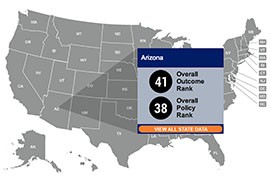By WHITNEY OGDEN
Cronkite News Service
WASHINGTON – More than 40 percent of Arizona households are on the brink of “financial devastation,” according to a national report that again ranked the state among the worst in terms of its residents’ financial security.
The Assets and Opportunity Scorecard released Thursday graded states based on residents’ liquid assets and on policies aimed at helping struggling families, among other measures. The 2014 report by the Corporation for Enterprise Development ranked Arizona 41st overall.
The report said 45.7 percent of Arizona households are in a “persistent state of financial insecurity,” essentially unchanged from last year’s 45.2 percent.
“In a general sense, we aren’t doing very well,” said Cynthia Zwick, executive director of Arizona Community Action Association. “We were hit pretty hard by the recession, which we’re still climbing out of.”
Zwick said because of the recession, Arizona cut many services and resources. That left families hit by the economic downturn “literally living paycheck to paycheck” with no help from the state. She said Arizona now has the fifth-highest rate of poverty in the country, with 19 percent of its residents living below the poverty line.
“They’re working one to two jobs and still not able to … make ends meet,” Zwick said.
CFED President Andrea Levere said the financially insecure residents highlighted in the report are “liquid-asset poor,” meaning they do not have savings to cover “basic expenses” at the poverty level for three months if hit by a financial emergency, such as a health expense or a car problem.
“In the U.S., 44 percent couldn’t even live at the poverty level,” for those three months, Levere said. “And in Arizona it’s even worse, it’s at 46 percent.”
The report also scored states on 67 different policy measures that it said could address the financial challenges of residents. Arizona ranked 38th in this category.
Sapna Gupta, senior policy analyst at Arizona State University’s Morrison Institute for Public Policy, said the report’s findings were not surprising. But she thinks there is hope for Arizona in at least one category: Health-care policy, where Arizona is currently ranked 34th.
“That number for health care can change,” said Gupta, who thinks the number might improve since state residents can now enroll for health care under Affordable Care Act.
“The number of uninsured will go down,” she said. “Once more Arizonans start enrolling … that (ranking) is going to change.”
Levere said one way Arizona could improve its overall ranking is by eliminating the asset limits that currently bar families from receiving Temporary Assistance for Needy Families if their savings exceed a certain amount. She called the limit “completely counterproductive.”
“You want to encourage people to build up even the smallest savings … so if something happens to the car, they can fix it so then they can get to their job so they don’t lose it,” Levere said.
Zwick said another way Arizona could improve is by boosting the average weekly unemployment benefit to at least 50 percent of the state’s average weekly wage.
“We have one of the lowest payments to an unemployed person of any state,” she said. “The maximum weekly unemployment benefit is $240 … that’s fairly low.”
However Arizona goes about it, Levere said policymakers need to act.
“There are lots of opportunities for the state of Arizona to help families,” she said.
Arizona Rankings
The Assets and Opportunity Scorecard ranked states for their policies and their actual situations, or “outcomes,” in five categories, and then gave an overall score.
For Arizona:
Overall outcomes rank: 41st
- Financial assets and income: 41st
- Business and jobs: 43rd
- Housing and homeownership: 19th
- Health care: 48th
- Education: 42nd
Overall policies rank: 38th
- Financial assets and income: 26th
- Business and jobs: 38th
- Housing and homeownership: 33rd
- Health care: 34th
- Education: 34th









No comments:
Post a Comment